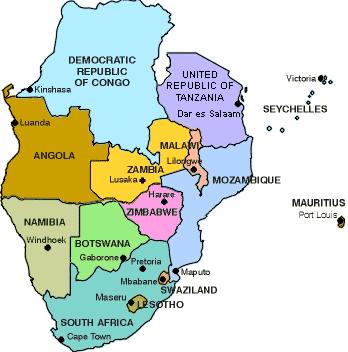By: Berhanu F Alemaw, Ph.D., Professor and P.E. Water Resources Engineer. Semu Moges, Ph.D., P.E, Water Resource Consultant and Scientist, the Water-Energy-Food Nexus Team
“Perhaps, the Nile is the only large river basin in the entire planet without inclusive framework agreement, legal and institutional regime for cooperative utilization of the basin. In addition, Nile is certainly the only river basin where downstream countries allocated 100% of the water and the rest of 9 riparian countries have been allocated zero percent of the water of the Nile.”
Africa has plenty of joint trans-boundary river basin management and water sharing agreements that may be lessons for the countries within the Nile basin. The most notable example from the experience of the authors is SADC’s (Southern African Development Community) regional protocol on shared water resources. In 1999, when the Nile basin countries were launching the Nile Basin Initiative (NBI), the SADC region was at an advanced stage of launching a Cooperative Framework Agreement (CFA) in order to better manage the region’s water resources. In 2000, the SADC region signed a revised SADC Protocol on Shared Watercourse System. The protocol is intended to promote joint and equitable shared management of Trans-boundary Rivers that resulted in cordial and peaceful institutions and implementation of joint projects in the region. Some of the institutional mechanisms operating in the SADC region for the management of their waters include:
- The Orange-Senqu River Commission (ORASECOM) of Botswana, Lesotho, Namibia and South Africa;
- The Zambezi Watercourse Commission (ZAMCOM) of 8 Riparian countries: Angola, Botswana, Malawi, Mozambique, Namibia, Tanzania , Zambia and Zimbabwe;
- The Limpopo Watercourse Commission (LIMCOM) among Botswana, Mozambique, South Africa and Zimbabwe; and
- The Permanent Okavango River Basin Commission (OKACOM) among Angola, Botswana and Namibia.
In spite of the learning experience from multiple basins in Africa and worldwide, and enormous emotional, intellectual, financial and global partnership efforts, the lack of inclusive cooperation agreement among the Nile countries in the 21st century is troubling. Perhaps, the Nile is the only large river basin in the entire planet without inclusive framework agreement, legal and institutional regime for cooperative utilization of the basin. In addition, Nile is certainly the only river basin where downstream countries allocated 100% of the water and the rest of 9 riparian countries have been allocated zero percent of the water of the Nile. It is fair to follow suit from our brothers in the SADC and advocate for joint utilization and management of the water resources of the Nile Basin. That is needed for human fraternity, equality and sustainable development.
Why is the Nile basin Cooperative Framework Agreement (CFA) stalled?
The Cooperation Framework Agreement (CFA) was negotiated over 10 years between the Nile basin countries and stalled to bring together the basin countries into cooperation. All riparian countries including Egypt and Sudan agreed to all the 45 articles of CFA except one sub-article, i.e. Article 14b as indicated in the NBI. All the upper riparian countries agreed to the text to reflect the UN water course principle as “not to significantly affect the water security of any other Country.” Contrary to this, Egypt wants the statement to be replaced as “not to adversely affect the water security and current uses and rights of any other Nile Basin State (NBI, n.d.).”
The irony is that the text presented by Egypt leaves zero percent of water to upstream riparian countries as the 1959 Egypt-Sudan agreement allocates 100% of the water to them and zero percent to other 9 upper riparian countries. The notion that the upper riparian countries will sign the CFA document that preserves the 1959 agreement to the downstream countries of Egypt and Sudan is a non-starter at the beginning. What is most astounding is the complacency of Sudan to this derogatory text that gives zero percent for all upper riparian countries.
Moreover, was there really a need for 10 years long negotiation on CFA if all the ongoing efforts were to protect the 1959 bilateral 100% water agreement that has no share to upper riparian countries and that is not inclusive agreements?
The conclusion of CFA has a positive bearing on GERD and other upstream projects. But conclusion of agreement on GERD prior to CFA will have the consequence of undermining the basin wide Cooperation Framework Agreement (CFA). If Egypt forces to get a good concession from Ethiopia, they have a deal from ~ 85% of the Nile water and it is unlikely that they will ever sign the CFA. Egypt may have calculated this and would as much as possible push for GERD agreement and stall the CFA. However, delayed basin wide cooperative agreement any further is inviting additional complexities to the negotiation and opening up the basin for increased unilateral complexity. When the bilateral 1959 agreement was signed, the total population of the basin countries was about 96 million. Currently the population of the basin stands over 550 million. It was easier to conclude comprehensive agreements in 1960s and 1970s than now. It will be more complex and impossible to conclude comprehensive agreement in 2050 when the basin population hits above 1 billion marks.
How do the three countries of EES (Ethiopia, Egypt, & Sudan) resolve the GERD crisis?
- Among others, reset the negotiation by consulting SADC’s authorities and learning a lesson. The three countries EES along with other Nile basin countries shall exchange lessons from SADC and build trust and confidence.
- CFA provides a legal framework to conclude project level agreements like the GERD. The current negotiation between Egypt, Ethiopia and Sudan hits rock bottom because it lack the support of such overarching legal framework. It is not in the interest of Ethiopia and the Nile basin countries, to sign legally binding agreement on GERD operation before adopting basin wide agreement. It undermines the basin tenants of basin wide cooperation, and the Nile countries effort for inclusive cooperative agreement and institutional mechanism.
- Conclusion of the GERD operation between Egypt, Ethiopia and Sudan may be in the best interest of the three countries; however, it may not carry the best interest of the Nile basin. Therefore, Ethiopia shouldn’t allow the conclusion of such agreements before the two countries of Egypt and Sudan sign the CFA. It undermines the future basin wide management and development efforts; it leaves the rest of the upper riparian countries weak and divided in front of the new agreement.
- Egypt and Sudan should learn a lesson from SADC and other African basin cooperation, step out of the shadow of the colonial era bilateral agreements, enter into a new era of inclusive agreements (e.g. signing CFA) and establish independent institution and basin governance system for the Nile basin.
- The SADC experience provides sufficient evidence on basin cooperation agreements that could minimize conflict and hydro-political tensions.
For any feedback, comments or questions, please email to: [email protected] or [email protected].


